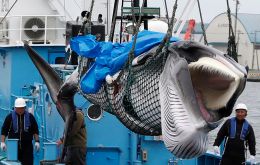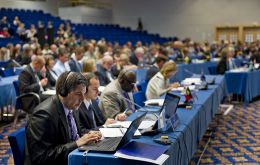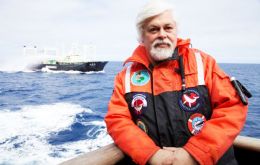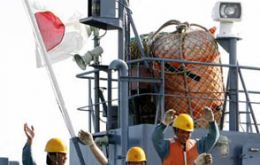MercoPress. South Atlantic News Agency
Tag: International Whaling Commission (IWC)
-
Wednesday, December 18th 2024 - 07:44 UTC
Denmark releases anti-whaling activist Paul Watson; pledges to continue battling Japan’s illegal operations

The Canadian-American anti-whaling activist Paul Watson was released from a Greenland jail after a five-month detention, where he was detained on an international arrest warrant by Interpol on request from the Japanese government.
-
Tuesday, August 2nd 2022 - 08:56 UTC
Japanese whaling industry on the brink of collapse: less demand, less subsidies for whale meat

The whaling industry in Japan is on the brink of collapse as young generations tastes have rapidly changed and government subsidies are beginning to shrink. The industry employed thousands of people in the decades immediately after World War II, and sustained entire communities during those difficult economic times, is today losing the government subsidies that has kept it afloat.
-
Thursday, December 27th 2018 - 04:22 UTC
Sea Shepherd celebrates Japan will cease whaling around Antarctica

Marine conservationists Sea Shepherd are claiming Japan's decision to abandon whaling around Antarctica as a victory, though their battle will go on with the Asian nation moving to resume hunting elsewhere. On Boxing Day, Japan announced it was leaving the International Whaling Commission so it could resume commercial hunting of the marine mammals in their territorial waters.
-
Friday, September 14th 2018 - 08:28 UTC
Support for Brazilian proposal to safeguard whales in perpetuity: Japan and allies furious

Tempers flared at the International Whaling Commission (IWC) on Thursday as it voted to back a Brazilian proposal which would safeguard whales in perpetuity, after a bitter debate. The biennial meeting of the 89-nation body passed the host country's “Florianopolis Declaration” which sees whaling as no longer being a necessary economic activity.
-
Thursday, September 13th 2018 - 06:02 UTC
South Atlantic sanctuary for whales will have to wait for another meeting of IWC

An effort to create a safe haven for whales in the South Atlantic was defeated at the meeting of the International Whaling Commission (IWC) in Florianopolis, Brazil. The proposal, which was introduced by Brazil in 2001, received support from 39 countries but was opposed by 25, denying it the three-quarters' majority it needed to pass.
-
Tuesday, September 11th 2018 - 09:06 UTC
Japan insists with a “Sustainable Whaling Committee” to replace moratorium on whale hunting

Pro and anti-whaling nations locked horns on Monday as the International Whaling Commission (IWC) began meeting in Brazil amid outrage over Japan's proposal to end a three-decade moratorium on commercial whale hunting.
-
Monday, September 10th 2018 - 08:30 UTC
Pro and anti-whaling nations clash in Brazil; renewed attempt to create a South Atlantic Whale Sanctuary

Pro and anti-whaling nations are set for a showdown when the International Whaling Commission (IWC) meets in Brazil from Monday as Japan leads an assault on a three-decade old moratorium on commercial whale hunting. Tokyo heads into the biennial meeting as chair of the 88-nation body determined to shake-up what it says is a dysfunctional organization mired in dispute and unable to make key decisions.
-
Wednesday, August 30th 2017 - 08:07 UTC
Anti-whaling group Sea Shepherd admits defeat: “we can't match Japan's military surveillance technology”

The anti-whaling group Sea Shepherd has announced it will not intercept Japanese vessels in the Southern Ocean this season. The group's ships have confronted Japanese vessels off Antarctica each year since 2005.
-
Monday, October 19th 2015 - 21:46 UTC
Polar operators keen on conducting citizen science projects

Field staff from the International Association of Antarctic Tour Operations (IAATO) and the Association of Arctic Expedition Cruise Operators (AECO) got together in Toronto last month in the first Polar field staff conference ever held. Seventy-five people attended over the three days representing 24 IAATO/AECO members, three governments, three universities and the World Wildlife Fund.
-
Wednesday, November 19th 2014 - 07:51 UTC
Greenpeace condemns Japan’s rush to resume Antarctic whaling

Greenpeace on Tuesday condemned the Government of Japan's rush to resume Antarctic whaling and called on them to abide by world opinion and the clearly expressed desires of the International Whaling Commission (IWC).
